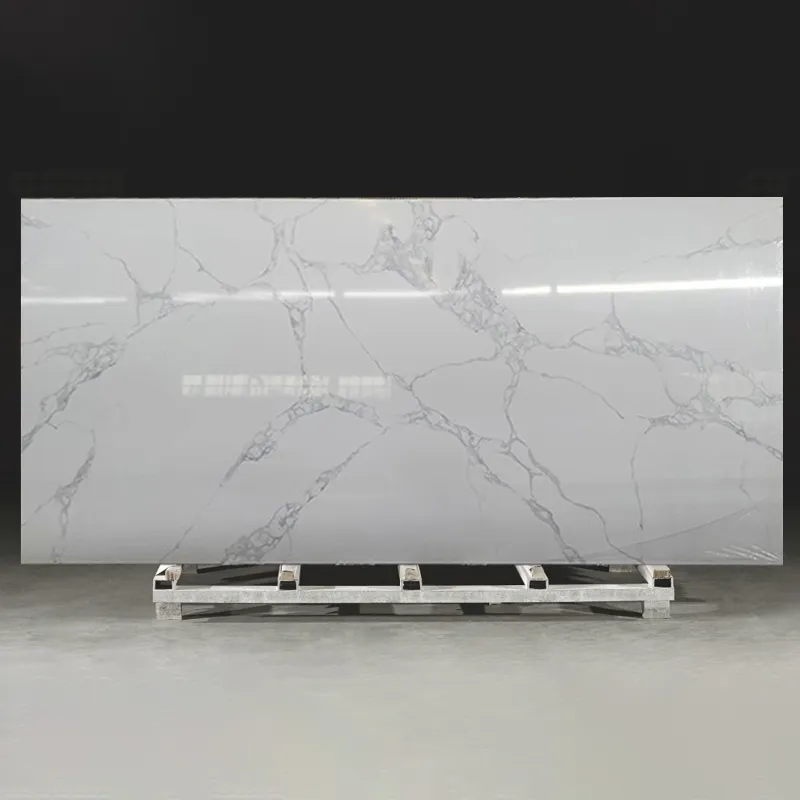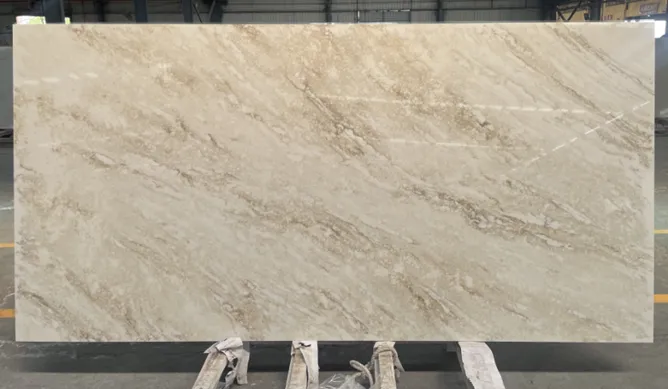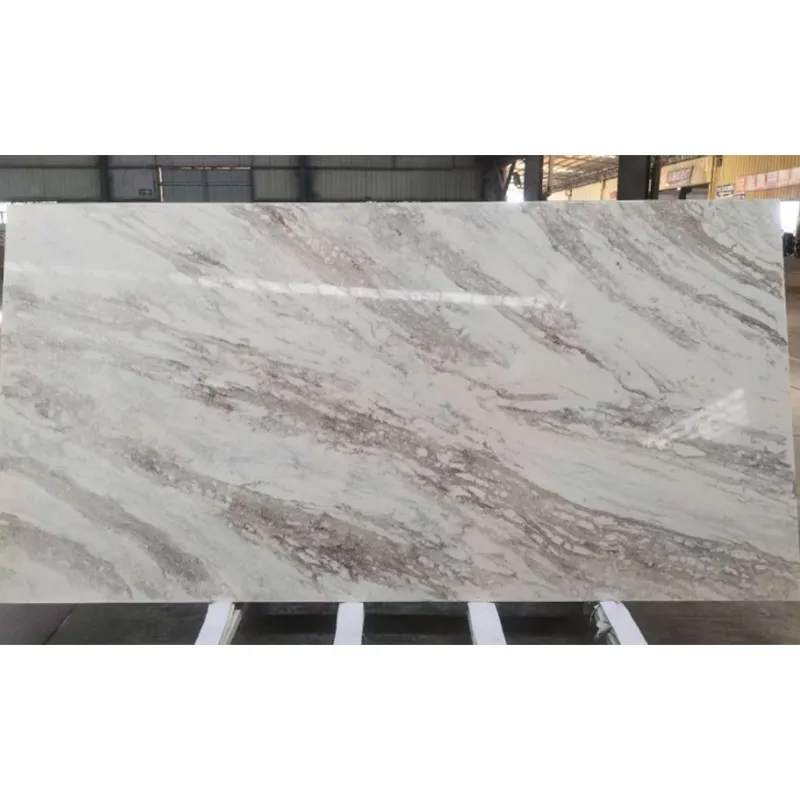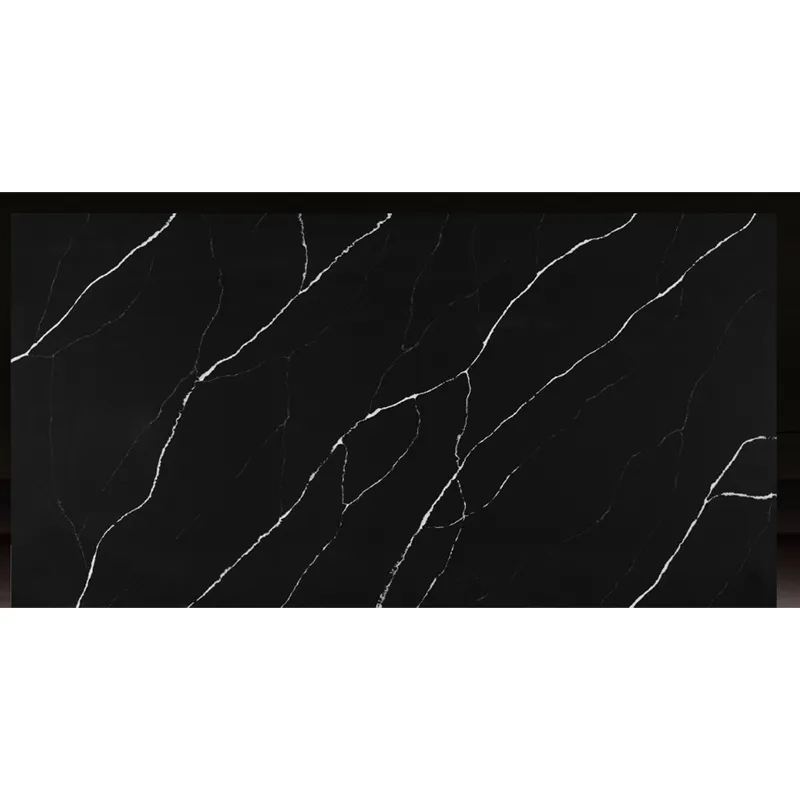Quartz stone countertops are the material of choice for many homes and commercial spaces because of their beauty, durability, and stain resistance. In addition to being a work surface, quartz is also commonly used for backsplashes, a vertical finish mounted on the wall to protect the wall from oil, water stains, and food residues from cooking. Regarding the thickness of the backsplash, many consumers will ask an important question: Is a 3cm thick quartz stone countertop too thick for a backsplash?
This article will take a deep look at the suitability of a 3cm quartz stone countertop for a backsplash, explore its pros and cons, and other influencing factors, to help consumers make an informed choice during the renovation process.

What are the functions and common materials of a backsplash?
The main function of a backsplash is to protect the wall, especially the area near the stove and sink, from moisture, oil, and food splashing onto the wall. A good backsplash should be water-resistant, heat-resistant, and easy to clean, while also improving the overall aesthetics of the kitchen or bathroom.
Common materials
Currently, the common splashback materials on the market are ceramic tiles, glass, stainless steel, natural stone and quartz plates. Quartz materials have gradually become one of the popular choices for splashbacks due to their unique durability, low maintenance requirements and rich color options. Compared with ceramics or glass, quartz plates can not only prevent erosion from oil stains and heat, but also maintain the same design style as quartz stone countertops, making the entire space more coordinated and unified.
Thickness requirements for splashbacks
Generally speaking, splashbacks are thinner, usually between 1.5 cm and 2 cm. Its original design intention was to provide protection for the wall while minimizing the encroachment on the space. Thin splashbacks can be installed on the wall more easily without affecting the kitchen's operating space too much. Although the 3 cm thick quartz stone countertop is very common in countertop applications, its thickness may bring some problems and challenges when used for splashbacks.

What are the advantages of using a 3 cm quartz stone countertop for a splashback?
While most splashbacks use thinner materials, there are some cases where a 3 cm thick quartz stone countertop has its own unique advantages for splashbacks.
Sturdiness and Durability
A 3 cm thick quartz stone countertop is more sturdy and durable than thinner splashback materials. Since quartz is a composite material made by mixing natural quartz crystals with resin, it has high compressive strength and scratch resistance. Thicker 3 cm quartz slabs are less likely to be damaged by accidental impacts or collisions with heavy objects than 1.5 cm or 2 cm thin slabs, especially in high-traffic, frequently used kitchen environments.
In the application of splashbacks, although its main function is to protect the wall from oil and water stains, it may occasionally suffer from accidental bumps or scratches. The 3 cm quartz stone countertop provides additional protection and reduces the risk of breakage and cracking.
Visual Effect
A thick quartz stone countertop splashback will give people a more luxurious and atmospheric feeling visually. If consumers want the kitchen or bathroom to present a solid and heavy design style, a 3 cm quartz stone countertop can enhance the overall visual impact. It can give people a modern, minimalist but textured space effect, especially suitable for those who pursue high-end decoration style.
In addition, using quartz slabs of the same thickness as the countertop as splashbacks can ensure the consistency and continuity of the design and reduce the abruptness of the transition. The thick quartz stone countertop splashback has a strong presence on the wall and can become one of the focal points of the kitchen design.

What are the Pros of using 3 cm quartz stone countertops for splashbacks?
Although 3 cm thick quartz splashbacks have their advantages, in practical applications, this thickness may also bring some problems and challenges that cannot be ignored.
The impact of thickness on space
Splashbacks are veneers installed vertically on the wall. The thickness of 3 cm is much thicker than traditional splashback materials. This thickness may have a greater impact on the spatial layout of the kitchen or bathroom, especially in compact kitchen designs. A 3 cm quartz stone countertop backsplash takes up more vertical space, making the distance between the kitchen countertop and the wall appear more compact.
Especially in areas close to cabinets or appliances, a backsplash that is too thick may prevent the cabinet door from opening completely or affect the placement and use of kitchen appliances. If wall-mounted cabinets are installed above the countertop, a thicker quartz stone countertop backsplash may cause an uncoordinated gap between the cabinet and the wall, or even cause installation problems.
Increased Installation Complexity and Cost
Thicker quartz stone countertop backsplashes not only increase the weight of the material itself, but also make the installation process more complicated. A 3 cm thick quartz slab weighs more than 50% more than a 1.5 cm or 2 cm thick backsplash. This means that more labor and more specialized equipment are required to carry, cut and fix these quartz slabs during the installation process.
In addition, due to the limited support capacity of the wall, a thick quartz backsplash may require additional wall reinforcement or special installation fixtures. This not only increases the difficulty of installation, but also significantly increases the installation cost. Compared with thinner splashback materials, 3 cm thick quartz stone countertops may face more inconvenience and additional costs during installation.
Aesthetics and design issues
While 3 cm quartz stone countertops can provide a more stable visual effect for splashbacks, this thickness may appear too bulky in some design styles. Especially in some modern kitchen designs that pursue simplicity and lightness, too thick splashbacks will destroy the balance of the entire space and appear too abrupt and heavy.
In addition, the thickness difference formed by the 3 cm quartz stone countertop on the wall may cause a clear transition layer at the connection between the countertop and the splashback. This sense of layering may not be ideal in some designs and affect the overall aesthetics. In contrast, thinner splashback materials are easier to integrate with the countertop and form a smoother transition effect.

Alternatives to splashbacks of other thicknesses
For consumers who are considering 3 cm quartz stone countertops for splashbacks but are worried about the problems caused by its thickness, there are actually some more practical alternatives.
2 cm thick quartz backsplash
A 2 cm thick quartz stone countertop backsplash is a good middle ground. It is lighter and easier to install than a 3 cm quartz slab, while still offering the durability and beauty of quartz. The 2 cm thickness is not visually too bulky, but still provides enough sturdiness to prevent bumps and damage.
Thin sheet quartz (1.5 cm or 1.2 cm)
Some quartz manufacturers have introduced thinner quartz slabs, usually 1.5 cm or 1.2 cm thick. This thin sheet quartz material is particularly suitable for backsplashes because it provides protection while reducing the intrusion on the space and making it easier to install. Thin sheet quartz retains all the advantages of quartz material and is suitable for consumers who want to maintain a modern, minimalist design.
Mixed material design
In some design projects, consumers can also choose to combine quartz stone countertops with backsplashes of other materials. For example, a quartz stone countertop can be paired with ceramic tile or glass splashback to provide a sturdy work surface while creating a light, flexible design on the wall. This mixed-material design can enhance the visual impact of a kitchen or bathroom while avoiding the problem of excessive thickness of quartz slabs.
Foshan Rongguan Glass Material for Building Co., Ltd. (Rongguan) is proud to be a leading force in the global building materials industry. With a focus on innovation and craftsmanship, we manufacture top-quality quartz stone countertops, terrazzo flooring, and artificial marble to meet diverse project requirements. Our 300,000-square-meter facility in Foshan is equipped with over 10 advanced production lines, enabling us to produce materials that excel in durability and style. Whether you're sourcing for residential, commercial, or industrial

